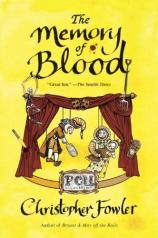The Memory of Blood: A Peculiar Crimes Unit Mystery
Review
The Memory of Blood: A Peculiar Crimes Unit Mystery
One recurring event that always brings a genuine smile to my face is the arrival of a new Peculiar Crimes Unit (PCU) mystery by Christopher Fowler. The series has been a winner from its very beginning, up to and including THE MEMORY OF BLOOD, the ninth and latest volume.
The PCU is a law enforcement agency conceived and midwifed by England’s Churchill administration during World War II. Based in London, it has evolved into a red-headed stepchild, as far as the government is concerned, particularly since it is uncommonly good at solving impossible crimes. The senior detectives of the PCU have been with the agency almost since its inception. Arthur Byrant, in spite of himself, is quirky, eccentric and brilliant. John May is steady and grounded. As unlikely a pair as one might find on either side of reality, the two detectives are polar opposites and steady friends.
"[T]he best reason to begin your PCU education with THE MEMORY OF BLOOD is its strong plotting, dark humor and, most of all, the confounding mystery at the heart of the whole thing."
THE MEMORY OF BLOOD begins and ends with the same party, but all is not festivals and fun under the surface. At a somewhat different party, one being held for the cast of a new play on its opening night, a particularly shocking and heinous killing takes place. One of the more interesting elements is that there is a unique twist on the classic “locked room” scenario, used here to great effect. But the theme of the initial murder and the subsequent ones that take place center on the “Mr. Punch” mythos, a character who has been part of the British low theater for over three-and-a-half centuries. It turns out that Mr. Punch has endured for far longer than a number of the characters. People fall victim to the unseen killer, who leaves a puppet associated with the enduring figure at the scene of each crime. Bryant has a pretty good idea of who the culprit is early on, but knowing and proving it are two different things.
In addition, someone with a vested interest in the dissolution of the PCU starts throwing red herrings into the middle of the unit, hoping that a failure in closing the case will result in the unit’s all-but-certain end. Bryant has inadvertently put its demise on the radar of its most mortal enemy for an entirely new reason. By the end of the book, the PCU is triumphant, but Bryant and May smell the chum in the waters. Still, they are not going down without a fight, one that undoubtedly will be played out --- bloodied knuckles and all --- in future volumes of the series.
Fowler points out in his acknowledgments that the books in this series may be read in any particular order. While certainly true, this latest installment is a particularly good place to begin for those unfamiliar with the series. It includes an “eyes only” report --- sourced from Wikileaks, of course --- on the history of the PCU and biographical data concerning each of the team’s members. But the best reason to begin your PCU education with THE MEMORY OF BLOOD is its strong plotting, dark humor and, most of all, the confounding mystery at the heart of the whole thing.
Reviewed by Joe Hartlaub on March 29, 2012





